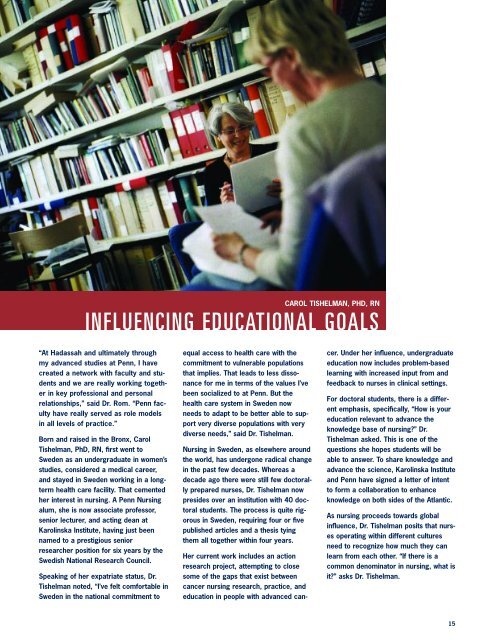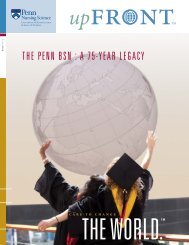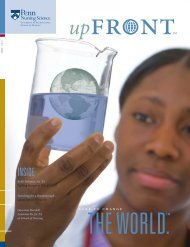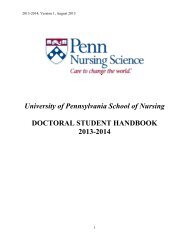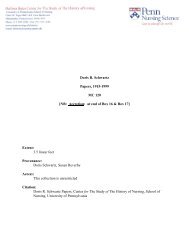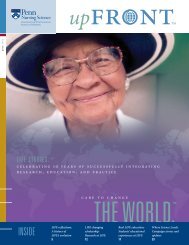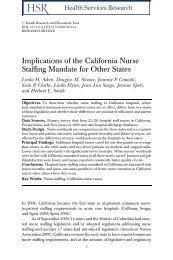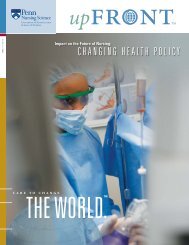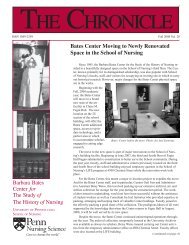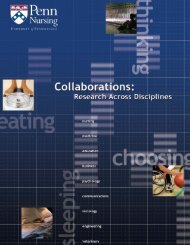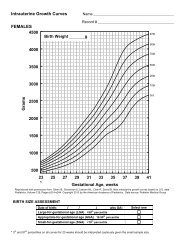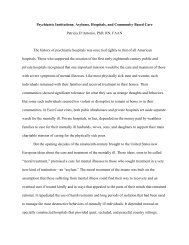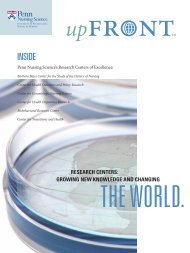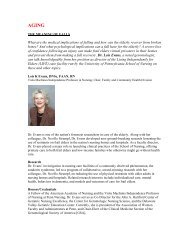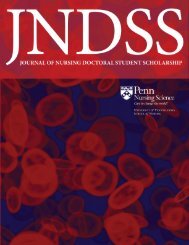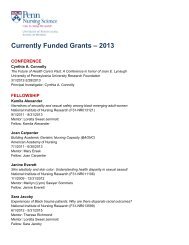Establishing Global Partnerships - University of Pennsylvania ...
Establishing Global Partnerships - University of Pennsylvania ...
Establishing Global Partnerships - University of Pennsylvania ...
You also want an ePaper? Increase the reach of your titles
YUMPU automatically turns print PDFs into web optimized ePapers that Google loves.
CAROL TISHELMAN, PHD, RN<br />
INFLUENCING EDUCATIONAL GOALS<br />
“At Hadassah and ultimately through<br />
my advanced studies at Penn, I have<br />
created a network with faculty and students<br />
and we are really working together<br />
in key pr<strong>of</strong>essional and personal<br />
relationships,” said Dr. Rom. “Penn faculty<br />
have really served as role models<br />
in all levels <strong>of</strong> practice.”<br />
Born and raised in the Bronx, Carol<br />
Tishelman, PhD, RN, first went to<br />
Sweden as an undergraduate in women’s<br />
studies, considered a medical career,<br />
and stayed in Sweden working in a longterm<br />
health care facility. That cemented<br />
her interest in nursing. A Penn Nursing<br />
alum, she is now associate pr<strong>of</strong>essor,<br />
senior lecturer, and acting dean at<br />
Karolinska Institute, having just been<br />
named to a prestigious senior<br />
researcher position for six years by the<br />
Swedish National Research Council.<br />
Speaking <strong>of</strong> her expatriate status, Dr.<br />
Tishelman noted, “I’ve felt comfortable in<br />
Sweden in the national commitment to<br />
equal access to health care with the<br />
commitment to vulnerable populations<br />
that implies. That leads to less dissonance<br />
for me in terms <strong>of</strong> the values I’ve<br />
been socialized to at Penn. But the<br />
health care system in Sweden now<br />
needs to adapt to be better able to support<br />
very diverse populations with very<br />
diverse needs,” said Dr. Tishelman.<br />
Nursing in Sweden, as elsewhere around<br />
the world, has undergone radical change<br />
in the past few decades. Whereas a<br />
decade ago there were still few doctorally<br />
prepared nurses, Dr. Tishelman now<br />
presides over an institution with 40 doctoral<br />
students. The process is quite rigorous<br />
in Sweden, requiring four or five<br />
published articles and a thesis tying<br />
them all together within four years.<br />
Her current work includes an action<br />
research project, attempting to close<br />
some <strong>of</strong> the gaps that exist between<br />
cancer nursing research, practice, and<br />
education in people with advanced cancer.<br />
Under her influence, undergraduate<br />
education now includes problem-based<br />
learning with increased input from and<br />
feedback to nurses in clinical settings.<br />
For doctoral students, there is a different<br />
emphasis, specifically, “How is your<br />
education relevant to advance the<br />
knowledge base <strong>of</strong> nursing?” Dr.<br />
Tishelman asked. This is one <strong>of</strong> the<br />
questions she hopes students will be<br />
able to answer. To share knowledge and<br />
advance the science, Karolinska Institute<br />
and Penn have signed a letter <strong>of</strong> intent<br />
to form a collaboration to enhance<br />
knowledge on both sides <strong>of</strong> the Atlantic.<br />
As nursing proceeds towards global<br />
influence, Dr. Tishelman posits that nurses<br />
operating within different cultures<br />
need to recognize how much they can<br />
learn from each other. “If there is a<br />
common denominator in nursing, what is<br />
it?” asks Dr. Tishelman.<br />
15


